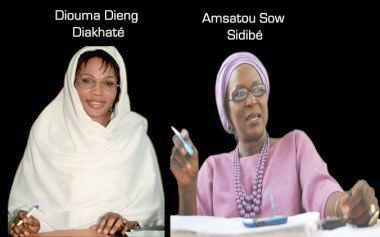2012 Elections Monitoring
As Senegal gears up for this weekend’s elections, the events of the campaign have already been nothing short of historic. For the first time in Senegal’s history, there are two female presidential candidates in this year’s elections, signaling an important step in women’s political participation in this region. The two women—Professor Amsatou Sow Sidibe and Madam Dieng Douma Diakhate—have been qualified by the country’s Constitutional Court in the predominantly Muslim nation out of a list of 14 presidential candidates.
Amsatou Sow Sidibe said that if elected, she would be a strong supporter of women’s rights. “I will do a lot for women, because I know the importance of women in family and society in general. But I will not just be for women, I will also work for men and an equal society.”ii Sidibe also stressed the importance of women’s roles in conflict resolution and their presence at the negotiation table.
“Feminine leadership is really important for democracy, for development and for peace,” Prof. Amsatou Sow Sidibei
Sidibe is one of 13 opposition figures facing current President Abdoulaye Wade in the West African country’s upcoming election. She has joined the other opposition candidates in denouncing the candidacy of Wade, who is running for his third term despite a constitutional two-term limit. Sidibe even reported foul play on the part of Wade’s campaign when traveling to a campaigning destination: “Wade’s security guards ordered me to take the sandy road, because Abdoulaye Wade had to take the paved road. Yet Wade arrived by helicopter. They broke the principle of equality among candidates.”iii
Quotas in Senegal
The electoral law was amended in 2010, providing a mandatory requirement that all candidate lists for legislative, regional, municipal and rural elections be comprised of equal number of male and female candidates, presented on the list in an alternating manner. This new legal framework for gender parity in electoral lists will be launched during the parliamentary elections held this year. vi
A lot of power resides in the president’s position. The President is elected by absolute majority vote through a two-round system to serve a 5-year term. The president then appoints the Prime Minister. 35 seats in the Senate are indirectly elected to a 5 –year term through an electoral college while 65 members are appointed by the president to serve 5-year terms. 60 members of the national assembly are elected through a closed-list proportional representation system and 90 members are elected by plurality vote in single-member constituencies to serve 5-year terms.vii It is clear that the election of a female president will directly affect the level of gender parity and Senegal’s representational government.
About the two women candidates
Amsatou Sow Sidibé (59), hold a doctorate in law and political science from the Université Paris II. She has a long history of human rights as a lawyer and in her work as the Director of Studies at the Peace and Human Rights Institute at the Cheikh Anta Diop University of Dakar. As the director, she was invited to participate in a roundtable discussion with President Bill Clinton and Hilary Clinton on the topic of human rights in West Africa.iv 15 years ago, Ms. Sidibe co-founded the African Network for the Promotion of Women Workers with regional branches throughout West Africa giving women job training and legal education. She has published numerous works and papers on human rights and she was one of the 1000 women proposed fort the Nobel Peace Price 2005.
Dieng Douma Diakhate (65), a fashion designer, is he founder
of the complex Shalimar which has become a world-renowned designer, she is indeed one of the greatest designers in Africa. Her good reputation in this business is such that she has become unquestionably the preferred designer of Heads of State and other African first ladies. she is confident that a woman will win this year. Describing her nomination and success, Ms. Diakhate said "they've chosen me because they think I am an agent of change and I am going to change my country's political landscape."v She argued that she is speaking on behalf of Senegal’s downtrodden and unemployed and that more than anyone else, she represents change.

Election Outcome:
Victory Celebrations were heard around the capital city Dakar as the opposition party won the election, removing the long serving president Wade from his post. The Senegalese opposition candidate Macky Sall has won over Abdoulaye Wade, the incumbent president who sought a third term in office despite international calls for the end of his tenure.
This is a big hurdle for Senegal’s young democracy; even though they both lost in the first round of voting, Senegal’s two female presidential candidates set a very important precedent for Senegalese women in the public arena.
On the eve of the first round voting, tensions were high and ange
r mounted towards Wade who insisted on running for a third term. The African Union envoy suggested that if Wade were to win, she should promise to step down in two years, ensuring a peaceful transition. Amsatou Sow Sidibe, one of two female candidates in the election is quoted as saying: “I think it is totally illegal…In Africa, when ever you delay an election, you are asking for trouble,”[i] citing what happened this past year in Cote d’Ivoire.
An estimated 5.3 million people voted in Senegal’s presidential elections. As results progress, MEWC will follow progress towards women’s rights under the Sall presidency as well as changes to women’s politica
l participation in further elections down the line.
Representation of Women's Political Participation
|
Date of Presidential Elections |
Number of Female Presidential Candidates |
% Positions won by female candidates |
|
February 26, 2012 |
2 |
0 |
|
March 25, 2012 |
0 |
0 |
__________________________________________________________
http://wadr.org/en/site/news_en/2947/Senegal-makes-history-with-2-female-presidential-candidates.htm
